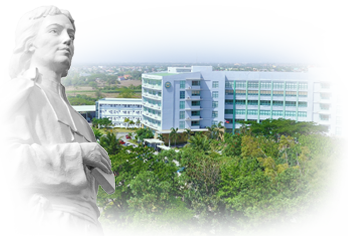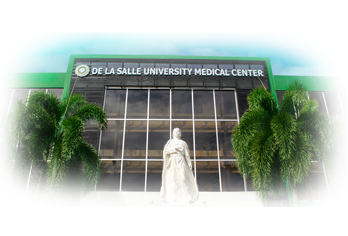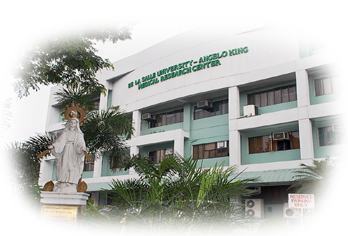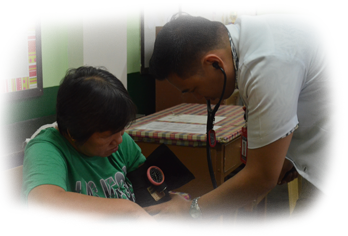
De La Salle Medical and Health Sciences Institute today is a premier higher education, health care, and research institution that forms future medical and health allied professionals who will have the commitment and dedication to become catalysts of the spiritual, social, and economic transformation of our country.
Its roots are equally noble. In 1977, the University Physicians Foundation, Inc, was organized to establish a medical school in Dasmariñas, Cavite, in support of the government’s policy of dispersing educational facilities outside Manila to ensure the delivery of quality health care in the regions. Originally named Emilio Aguinaldo College of Medicine, the school opened in 1979 with the Jose P. Rizal National Medical Research Center as its initial teaching hospital. Then on July 31, 1982, the Foundation inaugurated a 4-storey 180-bed teaching hospital, the University Medical Center. This was the forerunner of today’s De La Salle University Medical Center.
In June 1987, the ownership and management of Emilio Aguinaldo College of Medicine and the University Medical Center were acquired by the De La Salle Brothers. The College of Medicine was renamed the De La Salle University-Emilio Aguinaldo College of Medicine and the hospital the De La Salle University Medical Center.
Since then, the institution has continually expanded. In 1992, the college was renamed the De La Salle University College of Medicine. On April 7, 1994, the De La Salle University Angelo King Medical Research Center (DLSU-AKMRC) was established. In June 1994, the management of the College of Physical Therapy, which was established in 1982 as part of DLSU-Aguinaldo (now DLSU-Dasmariñas), was turned over to the De La Salle University College of Medicine . By June 1995, the complex consisting of the College of Medicine, University Medical Center, College of Physical Therapy, and DLSU-AKMRC was named De La Salle University – Health Sciences Campus or DLSU-HSC under the ownership and administration of the St. Bro. Miguel Febres Cordero Medical Education Foundation.
In October 1999, De La Salle University Medical Center gained the distinction of being the first hospital in the Philippines to have been awarded an ISO 9001 Certification by the TUV–Rheinland. In May 2000, more colleges were placed under the administration of DLSU-HSC with the transfer of the Colleges of Medical Radiation Technology and Nursing and Midwifery from DLSU-D. The College of Nursing and Midwifery was established in 1984 at DLSU-D, while the College of Medical Radiation Technology was established in1986. Both colleges have been renamed and are currently called College of Nursing and the College of Medical Imaging and Therapy, respectively.
The institution’s name became De La Salle Health Sciences Institute in September 2007. The change of name was arrived at to signal the Institution’s reinvigorated drive to pursue its mission and make a difference as a leading health education, health care, and research institution in the country.
In 2014, the institution experienced a rapid growth with the opening of three new programs under three new colleges – Bachelor of Science in Pharmacy (College of Pharmacy), Bachelor of Sciences in Medical Laboratory Science (College of Medical Laboratory Science), and the trimestral program, Bachelor of Science in Biochemistry (College of Humanities and Sciences).
In January 2018, the institution marked another landmark when it embraced a new name – De La Salle Medical and Health Sciences Institute. The inclusion of the term “Medical” manifests the institution’s progressive plan to introduce to the nation and the world the field of Medicine and all allied health sciences courses infused with the Lasallian brand of education which is defined by the values of Spirit of Faith, Zeal for Service, Communion in Mission, and Reverence for Life.
Today DLSMHSI takes pride in being the innovative leader in health care, education, and medical research in the region.
At present, the Institute offers academic programs through its seven colleges: Medicine, Rehabilitation Sciences, Medical Imaging and Therapy, Nursing, Pharmacy, Medical Laboratory Science, and Humanities and Sciences and a Special Health Sciences Senior High School. As it continuously pursues academic excellence, the Institute prides itself with the consistent outstanding performance of its graduates in licensure examinations.
The DLSUMC has also expanded its reach and services with the establishment of a separate Medical Arts Center for its outpatients, and advanced diagnostic and therapeutic services that are unrivalled in the region.
The DLS AKMRC, now Level 3 accredited by the Philippine Health Research Ethics Board, continues to be a trusted research institution and conducts the most number of clinical trials among private institutions in the country. It also became the first in the country to have been chosen by the US National Institutes of Health as a clinical research site for a global study. Most recently, it was tapped by the Philippine Council for Health Research Development to implement a multi-million study in tuberculosis.
With its acquisition of 9.448 hectares of adjacent properties, DLSMHSI is geared to make a leap in its strategic development efforts that include facilities like Birthing Home, Botanical Garden Park and Wellness Center, Capentry, Chapel on the Hill, Conservatory for Alternative Medicine, Dormitory, Exercise Trail, Football Field and Track Oval, Hospice Care for Abandoned Critically Ill and Dying Destitutes, Lawn Tennis Court, Motor Pool, Museum of the Human Body, Neuro Development Center for Children, Plants and Trees Nursery, Pater Noster Health Care Residence for Retired and Critically Ill Imus Clergy, Retreat and Conference Center, Security Services Unit, Seniors Assisted Living Health Care Residences, Sewage Treatment Plant, Shrine of St. Padre Pio and Shrine of the Holy Family.






